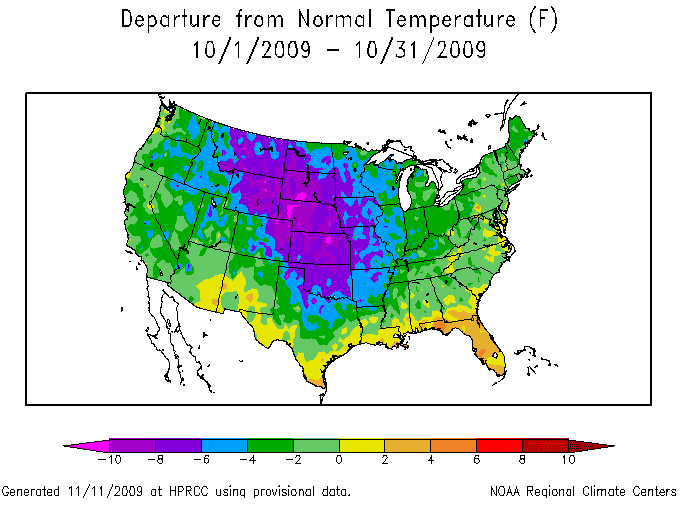Navigation
Install the app
How to install the app on iOS
Follow along with the video below to see how to install our site as a web app on your home screen.
Note: This feature may not be available in some browsers.
More options
You are using an out of date browser. It may not display this or other websites correctly.
You should upgrade or use an alternative browser.
You should upgrade or use an alternative browser.
Brrrrrrrrr
- Thread starter Sinatra
- Start date
Mr. H.
Diamond Member
Toro
Diamond Member
Its Obama's fault...
Article 15
Dr. House slayer
- Jul 4, 2008
- 24,673
- 4,916
- 183
It was over 50 degrees here the day after XMas.
Old Rocks
Diamond Member
So? And in 1934, we were far warmer than the rest of the world. In fact, in 2006, the US was either as warm, or nearly as warm, as in 1934. Now we are colder than the rest of the world. But the lower 48 only make up 2% of the area of the world. And the rest of the world has been warmer. Enough so that 2009 goes down on record as the fifth warmest year on record.
- Thread starter
- #6
___So? And in 1934, we were far warmer than the rest of the world. In fact, in 2006, the US was either as warm, or nearly as warm, as in 1934. Now we are colder than the rest of the world. But the lower 48 only make up 2% of the area of the world. And the rest of the world has been warmer. Enough so that 2009 goes down on record as the fifth warmest year on record.
Careful now - that was a hastily written press release in conjunction with Copenhagen. It was "projected" - much the way so much else regarding warming has been "projected"...
- Thread starter
- #7
What do you do when "global warming" turns into global cooling? How does a "scientist" handle data that does not support his theory? What's a "scientist" to do when he cannot prove man-made global warming after millions of dollars and many years trying? What do you do when 31,000 real scientists completely refute your contention of man-made global warming? What happens when your computer-generated models turn out to be 180 degrees out of synch?
If you are a global warming "scientist," you do several things: Hide all conflicting data, erase or destroy data that doesn't support your agenda, suppress any and all dissent from skeptics, tell everyone "the argument is over," change your vocabulary from "global warming" to "climate change" and try your best not to let the real data come out.
LETTER: Biggest hoax in history? | Climate Realists
If you are a global warming "scientist," you do several things: Hide all conflicting data, erase or destroy data that doesn't support your agenda, suppress any and all dissent from skeptics, tell everyone "the argument is over," change your vocabulary from "global warming" to "climate change" and try your best not to let the real data come out.
LETTER: Biggest hoax in history? | Climate Realists
Old Rocks
Diamond Member
Global cooling? This is what NASA says. Do you think that anybody is going to believe the politically inspired twaddle over real data?
Must-see NASA figures compare 2009 to the two hottest years on record: 2005 and 2007 « Climate Progress
NASA’s Goddard Institute for Space Studies posted these fascinating figures last week (click for PDF). Yes, the one place in the world where it warmed the least this year is, of course, the good old (continental) U.S. of A.
I noted last week that NASA reports hottest June to October on record*, but the figure and monthly data (here) reveal several other interesting things:
This year is currently on track to be the 5th warmest year on record, but, in fact, if the monthly temperature anomaly (compared to the 1951 to 1980 average) stays near where it has been for the last two months, then 2009 will surpass 2007 as the second hottest year on record.
If November’s anomaly is the same as the anomaly for the last two months, then November will tie for the hottest November in the temperature record.
If the average temperature anomaly during 2010 is only as high as it’s been from June to October of this year, then 2010 will roughly tie for the hottest year on record.
We’ll know about the first two above within a few weeks.
Must-see NASA figures compare 2009 to the two hottest years on record: 2005 and 2007 « Climate Progress
NASA’s Goddard Institute for Space Studies posted these fascinating figures last week (click for PDF). Yes, the one place in the world where it warmed the least this year is, of course, the good old (continental) U.S. of A.
I noted last week that NASA reports hottest June to October on record*, but the figure and monthly data (here) reveal several other interesting things:
This year is currently on track to be the 5th warmest year on record, but, in fact, if the monthly temperature anomaly (compared to the 1951 to 1980 average) stays near where it has been for the last two months, then 2009 will surpass 2007 as the second hottest year on record.
If November’s anomaly is the same as the anomaly for the last two months, then November will tie for the hottest November in the temperature record.
If the average temperature anomaly during 2010 is only as high as it’s been from June to October of this year, then 2010 will roughly tie for the hottest year on record.
We’ll know about the first two above within a few weeks.
Old Rocks
Diamond Member
Recent Climate Change - Temperature Changes | Science | Climate Change | U.S. EPA
Records from land stations and ships indicate that the global mean surface temperature warmed by about 0.9°F since 1880 (see Figure 1). These records indicate a near level trend in temperatures from 1880 to about 1910, a rise to 1945, a slight decline to about 1975, and a rise to present (NRC, 2006). The Intergovernmental Panel on Climate Change (IPCC) concluded in 2007 that warming of the climate system is now “unequivocal,” based on observations of increases in global average air and ocean temperatures, widespread melting of snow and ice, and rising global average sea level (IPCC, 2007).
According to the National Oceanic and Atmospheric Administration's (NOAA) 2008 State of the Climate Report and the National Aeronautics and Space Administration's (NASA) 2008 Surface Temperature
Records from land stations and ships indicate that the global mean surface temperature warmed by about 0.9°F since 1880 (see Figure 1). These records indicate a near level trend in temperatures from 1880 to about 1910, a rise to 1945, a slight decline to about 1975, and a rise to present (NRC, 2006). The Intergovernmental Panel on Climate Change (IPCC) concluded in 2007 that warming of the climate system is now “unequivocal,” based on observations of increases in global average air and ocean temperatures, widespread melting of snow and ice, and rising global average sea level (IPCC, 2007).
According to the National Oceanic and Atmospheric Administration's (NOAA) 2008 State of the Climate Report and the National Aeronautics and Space Administration's (NASA) 2008 Surface Temperature
- Sep 12, 2008
- 14,201
- 3,567
- 185
It is snowing outside my window.
Granny
Gold Member
I think maybe that's why they're not referring to "global warming" so much now as they are referring to "global change."
Old Rocks
Diamond Member
Very good. And the deep dive in 2008 meant that 2008 only turned out to be the 8th or 9th warmest year on record. So we have a solar minimum, a strong La Nina, and we still get the 8th or 9th warmest year on record. And, of course, were you to pick a differant start point, the slope of the graph would be flat, or even up.
You dingbat 'coolists' can only make your point by cherry picking data, and outright lying. However, what are you going to say if 2010 comes in close, or higher, than 1998?
You dingbat 'coolists' can only make your point by cherry picking data, and outright lying. However, what are you going to say if 2010 comes in close, or higher, than 1998?
elvis
Rookie
- Sep 15, 2008
- 25,881
- 4,472
- 0
- Banned
- #15
Very good. And the deep dive in 2008 meant that 2008 only turned out to be the 8th or 9th warmest year on record. So we have a solar minimum, a strong La Nina, and we still get the 8th or 9th warmest year on record. And, of course, were you to pick a differant start point, the slope of the graph would be flat, or even up.
You dingbat 'coolists' can only make your point by cherry picking data, and outright lying. However, what are you going to say if 2010 comes in close, or higher, than 1998?
cherry picking? sounds like Jones and Mann, doesn't it?
Old Rocks
Diamond Member
Referances to prove you point, silly old queer?
- Thread starter
- #19
Similar threads
- Poll
- Replies
- 16
- Views
- 200
- Replies
- 530
- Views
- 5K
- Replies
- 8
- Views
- 85
Latest Discussions
- Replies
- 143
- Views
- 972
- Replies
- 450
- Views
- 3K
- Replies
- 10K
- Views
- 292K
Forum List
-
-
-
-
-
Political Satire 8871
-
-
-
-
-
-
-
-
-
-
-
-
-
-
-
-
-
-
-
ObamaCare 781
-
-
-
-
-
-
-
-
-
-
-
Member Usernotes 492
-
-
-
-
-
-
-
-
-
-


